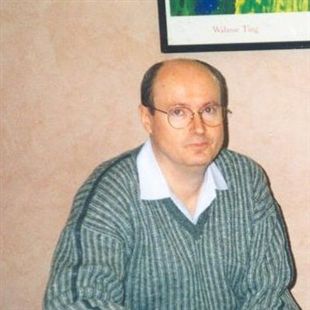 |
| Efrén Petite [Ajedrez365] |
Efrén Petite has been International Judge in two- and threemovers since 1966. He composed direct mates, selfmates and helpmates.
Show Solution
Rolf Uppström (10-06-1953) Swedish composer
Rolf Uppström wrote "Nordiska minimalproblem" in 2006 and is a co-worker of the Swedish magazine "Springaren".
He himself has composed quite a few direct mate minimals (white King + one white piece) such as this 8-mover. The following problem is rather different:
Show Solution
Marco Campioli (10-06-1954 - 17-10-2021) Italian composer
 |
| Marco Campioli, 2012 [sassuolooggi.it] |
Marco Campioli was an endgame study composer. As Peter Krug wrote in a comment:
"his style was unique and cannot be compared to other study composers. He was an important pillar in the Italian study composition. He was also often active as a judge. Marco Campioli's death is a great shock to the world of study composition."
Some more information and studies by Marco Campioli on ARVES website and also don't miss Peter Krug's comments below about Marco Campioli's compositional style.
Show Solution
Peter Hoffmann (10-06-1955) German composer and FIDE Master
 |
| Peter Hoffmann in the German town of Cochem in August 2014 [© Peter Hoffmann] |
Peter Hoffmann was the first composer to present a cyclic Babson task in orthodox moremover without promoted units. The problem and many other Babson tasks can be seen in his Babson task article on Ralf Krätschmer's website.
His talent is not limited to Babsons: in 2011 he was granted the title of FIDE Master and a commented selection of his problems in PDF format can be seen and downloaded on berlinthema.de.
Show Solution

Marco Campioli from Sassuolo (Italy)composed 354 studies. His style was unique and cannot be compared to other study composers.
ReplyDeleteHe was an important pillar in the Italian study composition. He was also often active as a judge. Marco Campioli's death is a great shock to the world of study composition. He died on October 17, 2021.
I have written something else about Marco Campioli: Marco Campioli and Professor Pietro Rossi were the dominant study composers in Italy for an extraordinary long period of time. Both sent their works to countless chess magazines in many countries. Both composers have received numerous awards in composition competitions. This outstanding achievement is unrivalled in Italy. M. Campioli composed with great energy for many years and was one of the most active study composers in Italy.
ReplyDeleteCampioi´s view on the subject of chess study
“Mi sono avvicinato al mondo degli scacchi – ha detto – dalla fine del liceo, poi mi sono dedicato alla studistica che, a mio parere, rappresenta la ricerca della bellezza degli scacchi”
Collaboration with the famous chess study composer, master Pietro Rossi
Marco Campioli also composed a lot with the great study composer Pietro Rossi. Together they created some perfectly formed, high-quality works of chess art.
About his compositional style
Master Mario Campioli had composed chess studies that were quite close to a game of chess. The collaboration with Prof. Pietro Rossi is worth mentioning.
However, a large number of his endgame studies have a part-deep starting position, which as a rule cannot occur in a chess game. His compositional style therefore can be described as grotesque. He was a very creative and original composer. His style can be compared with Michael Roxlau, who also often needed strong passed pawns immediately before the promotion to a queen, or a knight for the construction.
Campioli's style compared to Pietro Rossi
While master Pietro Rossi largely composed in the style of the old masters, Marco Campioli was comparatively much freer and more experimental. Marco Campioli did not have a study composer whom he imitated.
While Campioli had the great help of powerful chess engines, like Stockfish with which Campioli built his chess studies, Professor Rossi had to rely largely on his own analytical skills and endgame knowledge during his many compositional years. This is also one of the reasons why Rossi is regarded as Italy's greatest ever study composer. -This partly explains the difference in style between the two endgame study composers. Since the chess engines became better than the best chess player in man, chess as a whole became freer and more experimental. The same can be said of the chess compositions of the 21st century.